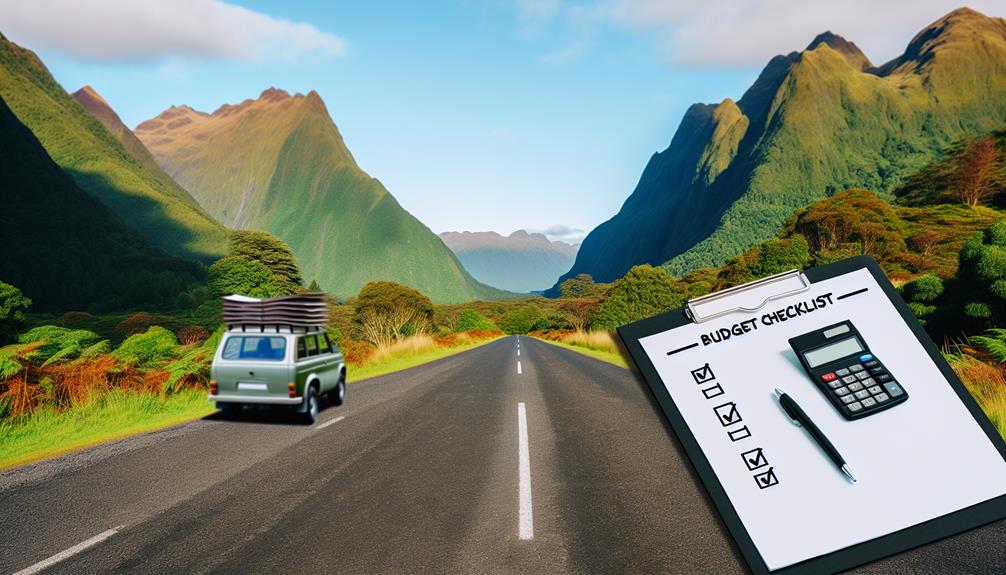Getting journey insurance for road trips starts with evaluating your trip costs. Calculate all pre-paid, non-refundable expenses such as accommodations and activities. Then, compare quotes from multiple providers to find the best rates and coverage. Focus on essential types like trip cancellation and emergency medical coverage. You should purchase your insurance soon after booking your trip to secure early purchase benefits. Furthermore, keep all receipts and documentation for any claims you may need to file later. By following these steps, you can safeguard your journey and enjoy peace of mind while traveling. There's plenty more to reflect on to guarantee you're fully protected.
Key Takeaways
- Research and compare quotes from various insurance providers to find the best journey insurance for your road trip needs.
- Ensure the policy includes essential coverage types such as trip cancellation, interruption, and travel medical insurance.
- Calculate all pre-paid, non-refundable expenses to determine the necessary coverage amount for your trip.
- Purchase the insurance within 21 days of making your trip deposit to take advantage of early purchase benefits.
- Retain all receipts and documentation to support any claims for cancellations or interruptions during your road trip.
Importance of Journey Insurance
When planning a road trip, having journey insurance is essential for safeguarding your investment. This type of insurance protects you against financial losses due to cancellations or interruptions, covering pre-paid non-refundable expenses. Imagine the peace of mind you'll gain knowing that if the unexpected happens, like a family emergency or severe weather, you're financially protected through trip cancellation coverage.
Road trip travel insurance often includes vital features like Emergency Medical Evacuation, which can be lifesaving if health issues arise in remote areas. Additionally, many travel insurance plans offer reimbursement for travel inconveniences, such as delays from weather or vehicle breakdowns, ensuring you're compensated for those unexpected disruptions.
If you're looking for more flexibility, consider optional upgrades like "Cancel for Any Reason" (CFAR). This allows you to cancel your trip for reasons outside standard coverage and still receive reimbursement. To maximize your benefits, purchasing journey insurance soon after making trip deposits is important. Early purchase can reveal better coverage options, leading to more extensive protection. Check customer reviews to find a plan that suits your needs. Don't leave home without the security that journey insurance provides!
Types of Coverage Available
Journey insurance offers various types of coverage tailored to meet the unique needs of road travelers. Understanding these options can help you choose the right plan for your journey.
| Type of Coverage | Description |
|---|---|
| Trip Cancellation Insurance | Reimburses non-refundable expenses if you need to cancel your trip for a covered reason. |
| Trip Interruption Insurance | Offers reimbursement for additional expenses if you need to return home early due to a covered reason. |
| Travel Medical Insurance | Covers medical emergencies during your trip, including emergency medical expenses and medical evacuation. |
| Coverage for Delays | Provides reimbursement for travel inconveniences like delays due to weather or vehicle breakdowns. |
Many insurance policies also offer additional coverage options, such as emergency medical evacuation and travel assistance services, which enhance your thorough coverage. This way, you can safeguard your investment and guarantee peace of mind while on the road. Remember, each plan varies, so it's crucial to review the details to find the best insurance coverage for your specific needs. Being prepared with the right journey insurance can make all the difference in your travel experience.
How to Assess Trip Costs

Understanding the types of coverage available is just the first step in preparing for a road trip. To accurately evaluate trip costs, start by summing all your pre-paid, non-refundable expenses like accommodations, transportation, activities, and meals. This will help you in your coverage calculations. Don't forget to take into account any additional costs that may arise during your journey, such as fuel, tolls, and emergency expenses; underestimating these can inflate your total trip cost.
Next, analyze the potential impact of unexpected events, such as natural disasters or health issues, which could lead to cancellations or interruptions. Factor these risks into your cost evaluation. It's also essential to include the cost of activities or excursions that require advance payment, as these can greatly affect your overall trip budget.
Lastly, review the cancellation policies and fees associated with each element of your trip. Knowing these can save you from potential financial losses if you need to cancel. By thoroughly evaluating your trip expenses, you'll have a clearer picture of how insurance can help protect your investment.
Claims Process Explained
Filing a claim for your travel insurance can feel intimidating, but knowing the process can make it much smoother. To start, you'll need to calculate your trip costs by adding up all your pre-paid, non-refundable expenses. This step guarantees you have accurate documentation when you're filing a claim. If your traveling companion cancels for a covered reason, you can also submit a claim, even if you decide to continue your trip.
When you're ready to initiate the claims process, you can do so online or through USI Travel Insurance Services, making reimbursement straightforward. Be sure to retain all receipts and relevant documentation related to your trip expenses, as this will support your claim effectively.
Keep in mind that claims for natural disasters or other covered events can trigger reimbursement, so it's crucial to understand the specific coverage terms outlined in your insurance policy. By having all your documentation in order, you'll be better prepared to navigate the claims process and receive the reimbursement you deserve. This knowledge can turn what seems like a overwhelming task into a manageable one.
Tips for Choosing Insurance

Choosing the right travel insurance for your road trip is a vital step in guaranteeing peace of mind on your journey. Start by comparing quotes from multiple insurance providers. This helps you find the best rates while evaluating coverage options that suit your needs. Focus on essential coverage types like trip cancellation, trip interruption, and emergency medical assistance to make sure you have thorough protection.
Consider purchasing travel insurance within 21 days of making your trip deposit to take advantage of early purchase benefits. This can enhance your coverage options considerably. Don't forget to thoroughly review policy details for limitations and exclusions, particularly regarding unique activities or pre-existing conditions. Understanding these aspects will help you avoid surprises later.
Lastly, keep all receipts and documentation related to your trip expenses handy. Retaining this information is vital for filing a claim and securing any reimbursements after unforeseen events. By taking these steps, you'll be better equipped to choose the right travel insurance for your road trips, ensuring you're prepared for whatever comes your way.
Frequently Asked Questions
Can You Buy Travel Insurance for a Road Trip?
Yes, you can buy travel insurance specifically for a road trip! This insurance covers cancellations, delays, and interruptions for your pre-paid, non-refundable expenses. Companies like RoadTripInsure offer extensive plans that include emergency medical expenses and vehicle coverage. If you're traveling with others, you can include up to 10 travelers under one reservation. Don't forget to purchase your insurance within 21 days of your trip deposit for the best options!
What Travel Insurance Do I Need for Travelling?
When you're traveling, you need to take into account what travel insurance suits your needs. Look for a plan that covers trip cancellations, interruptions, and delays, especially for non-refundable expenses. Emergency medical coverage is essential, as your health insurance might not cover all expenses abroad. Evaluate upgrades like "Cancel for Any Reason" for flexibility. Also, make sure it covers vehicle-related incidents, as they can happen during your trip. Always read the fine print to understand limitations.
How Much Does Travel Insurance Cost for One Trip?
Travel insurance costs for one trip typically range from 4% to 10% of your total trip cost. If you're planning a $2,000 trip, expect to pay between $80 and $200 for a standard policy. Keep in mind that options like "Cancel for Any Reason" can raise your premium considerably. To save money, purchasing early—within 21 days of your trip deposit—can lead to better rates and coverage options.
Can You Get Travel Insurance for a Trip Already Booked?
Yes, you can get travel insurance for a trip you've already booked. It's best to act quickly to guarantee you maximize your coverage benefits. Most plans allow you to purchase insurance up to 24 hours before your departure. If you buy within 21 days of your initial trip deposit, you might qualify for extra coverage options. Always check the policy details to understand what's covered, especially regarding pre-existing conditions and cancellation terms.
